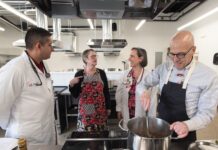
Faculty senators met June 5 on the HSC campus, where they were provided with a look at the proposed budget as presented by CFO Dan Durbin.
Durbin said the budget is meant to acclimate the Board of Trustees to the university’s priorities, but serves as a “status quo placeholder” this year, since we are on the verge of implementing a strategic plan. The two priorities are to be stable and predictable so we can start the work on that plan.
The proposed budget entails $23.8 million of costs, including a 2% salary increase. Durbin noted that this current year’s budget had $20 million of costs supported by one-time items, which is unsustainable.
“This budget is based on some assumptions, including the assumption that enrollment stays stable. If enrollment stays stable, we’re in good shape,” Durbin said.
There are tuition and fee increases requested to fund some priorities. The proposed face-to-face tuition increase is 2.5% for undergraduates, while the online learning fees have been restructured to match the current per-hour rate plus a $50 tech fee.
“We have been careful not to price ourselves out of the market,” Durbin said, showing a slide of our tuition, which remains lower than the University of Kentucky and Eastern Kentucky. Our proposed rates for the 2020 budget are also lower than UK’s proposed rates, including out-of-state, which is 2.5% at UofL compared to 6.2% at UK.
“We don’t think these fee increases place us at a competitive disadvantage,” Durbin said.
Durbin also noted that 62% of all beds will cost less in 2020 versus 2019, so housing costs will also be lower.
He also discussed the foundation’s spending policy and how it is expected to impact the university. The foundation had to rein in some spending this year to ensure the endowment funds stayed intact and were positioned to grow.
“We looked at every line of the budget. We will have some pain this year, but in the longer term, we will be good,” he said. “We think of this year as a re-set,” Durbin said. “In our current state – with stable enrollment and adjustments and tuition and fees – we have a balanced budget.”
Durbin’s full presentation is available online here.
President Neeli Bendapudi also provided an update for the senate, stating that she feels better about the budget than she did three months ago.
Still, administrators did recently discover the $20 million base budget covered by one-time dollars and had to make significant adjustments accordingly. One of those adjustments was in closing the Humana Gym. Doing this, Bendapudi said, saves UofL about $1 million a year.
Bendapudi apologized to the Faculty Senate for the way the administrators handled the decision-making and communication around the gym’s closing.
“I sincerely believe this decision was the right thing for the university. But we failed during the process. I will own that and I promise it will not happen again,” she said. “We’re learning. We’ll do better.”
Bendapudi plans to host a retreat this summer with her senior leadership team to discuss a new rubric for these types of decisions, including who provides input, who approves and how to communicate.
Keith Sherman, executive director of the UofL Foundation, which owns the Humana Gym building, added there was no easy fix to this issue.
“The facility was well under water, so it became a question of how we stop the bleeding as quickly as possible,” he said.
After going through each line of the budget, administrators have also discovered that the same dollars were promised to multiple deans.
“We don’t want this to happen again. We want a budget committee to be actively engaged and for every single person on our campus to be able to pull up our budget and understand it,” Bendapudi said.
Bendapudi provided an update from the CPE, encouraging all faculty members to be mindful of our performance funding model.
“The best thing we can do is make sure our students succeed. It’s the morally, ethically and financially right thing to do,” she said. “What we’re hoping is that no student graduates without an internship, co-op or student learning/experiential opportunity. That gives them the best chances.”
Bendapudi also briefly discussed the recent Passport deal, stating that she is confident it was the best outcome for the university and for the community. Because of non-disclosure agreements, she is still not able to talk much about the negotiations surrounding Jewish Hospital. She ended, however, by stating that she feels comfortable and confident.
Provost Beth Boehm also provided an update, noting that Vice Provost Mordean Taylor-Archer is retiring. Her areas include international and diversity. Diversity will be moved under the president’s office, and an open call for applications will be held for the diversity position with a short timeline. Boehm admitted that our culture needs to be improved so we stop losing faculty of color.
“We have to work on our environment so people don’t even look for jobs elsewhere,” she said.
Meanwhile, the international office will be under the provost’s office.
Michael Mardis, dean of students, has agreed to take on the international office in the interim and will work to figure out what that office will look like moving forward.
Committee meetings from the Faculty Senate are available online. The next Faculty Senate meeting is July 3 in Chao Auditorium.































